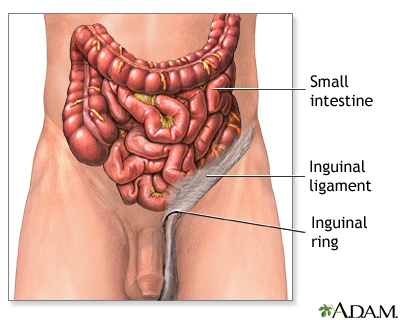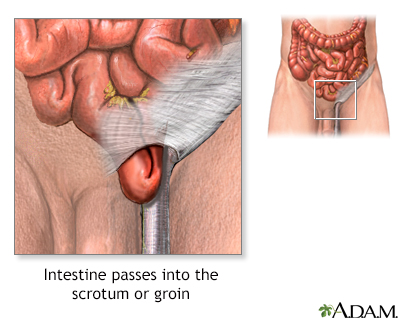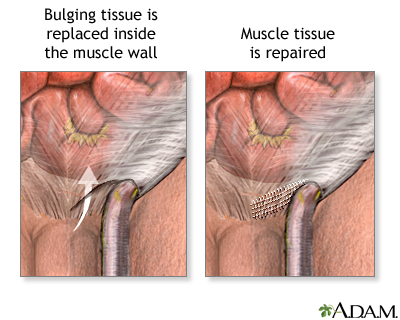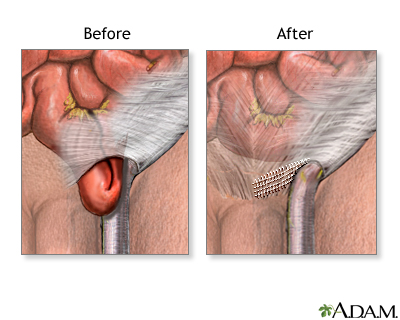Inguinal hernia repair - discharge
Herniorrhaphy - discharge; Hernioplasty - dischargeYou or your child had surgery to repair an inguinal hernia caused by a weakness in the abdominal wall in your groin area.
Repair an inguinal hernia
Inguinal hernia repair is surgery to repair a hernia in your groin. A hernia is tissue that bulges out of a weak spot in the abdominal wall. Your i...

Now that you or your child is going home, follow the surgeon's instructions on self-care at home.
When You're in the Hospital
During surgery, you or your child had anesthesia. This may have been general (asleep and pain-free) or spinal or epidural (numb from the waist down) anesthesia. If the hernia was small, it may have been repaired under local anesthesia (awake but pain-free).
General
General anesthesia is treatment with certain medicines that puts you into a deep sleep-like state so you do not feel pain during surgery. After you ...
Read Article Now Book Mark ArticleSpinal or epidural
Spinal and epidural anesthesia are procedures that deliver medicines that numb parts of your body to block pain. They are given through shots in or ...

Local anesthesia
Conscious sedation uses a combination of medicines to help you relax (a sedative) and to reduce pain (an analgesic) during a medical or dental proced...
Read Article Now Book Mark ArticleYour nurse will give you or your child pain medicine and help you or your child begin to move around. Rest and gentle movement are important for recovery.
You or your child may go home the same day as surgery. Or the hospital stay may be 1 to 2 days. It will depend on the procedure that was done.
What to Expect at Home
After a hernia repair:
- If there are stitches on the skin, they will need to be removed at a follow-up visit with your surgeon. If stitches under the skin were used, they will dissolve on their own. In some cases, there will be staples that need to be removed.
- The incision may be covered with a bandage. Or, it is covered with a liquid adhesive (skin glue).
- You or your child may have pain, soreness, and stiffness at first, especially when moving about. This is normal.
- You or your child will also feel tired after surgery. This can last for a few weeks.
- You or your child will most likely return to normal activities in just a few weeks.
- Men may have swelling and pain in their testicles.
- There may be some bruising around the groin and testicular area.
- You or your child may have trouble passing urine for the first few days.
Make sure you or your child gets plenty of rest the first 2 to 3 days after going home. Ask family and friends for help with daily activities while your movements are limited.
Managing Pain
Use any pain medicines as instructed by your surgeon or nurse. You may be given a prescription for a narcotic pain medicine. Ask your surgeon about using ibuprofen (Motrin, Advil) and acetaminophen (Tylenol) as an initial treatment for pain to reduce your need for narcotic pain medicine.
Apply a cold compress to the incision area for 15 to 20 minutes at a time for the first few days. This will help the pain and swelling. Wrap the compress or ice in a towel. This helps prevent cold injury to the skin.
Wound Care
There may be a bandage over the incision. Follow the surgeon's instructions for how long to leave it on and when to change it. If skin glue was used, a bandage may not have been used.
- A little bleeding and drainage is normal for the first few days. Apply antibiotic ointment (for example, bacitracin or bacitracin/polymyxin) to the incision area if your surgeon or nurse told you to.
- Wash the area with mild soap and water when your surgeon says it is OK to do so. Gently pat it dry. Do not take a bath, soak in a hot tub, or go swimming for the first week after surgery.
Diet During Recovery
Pain medicines can cause constipation. Eating some high-fiber foods and drinking plenty of water can help keep the bowels moving. Use over the counter fiber products if constipation does not improve.
Antibiotics can cause diarrhea. If this happens, try eating yogurt with live cultures or taking psyllium (Metamucil). Contact your surgeon if the diarrhea does not get better or is associated with fever.
Activity for Adults
Give yourself time to heal. You may gradually resume normal activities, such as walking, driving, and sexual activity, when you are ready. But you probably will not feel like doing anything strenuous for a few weeks.
Do not drive if you are taking narcotic pain medicines.
Do not lift anything over 10 pounds or 4.5 kilograms (about a gallon or a 4 liter jug of milk) for 4 to 6 weeks, or until your surgeon tells you it is OK. If possible, avoid doing any activity that causes pain, or pulls on the area of surgery. Older boys and men may want to wear an athletic supporter if they have swelling or pain in the scrotum or testicles.
Check with your surgeon before returning to sports or other high-impact activities. Protect the incision area from the sun for 1 year to prevent noticeable scarring.
Activity for Children
Toddlers and older children will often stop any activity if they get tired. Do not press them to do more if they seem tired.
Your surgeon or nurse will tell you when it is OK for your child to return to school or daycare. This may be as soon as 2 to 3 weeks after surgery.
Ask your surgeon or nurse if there are certain activities or sports your child should not do, and for how long.
Follow-up
Schedule a follow-up appointment with your surgeon as directed. Usually, this visit is about 2 weeks after surgery.
When to Call the Doctor
Contact your surgeon if you or your child has any of the following:
- Severe pain or soreness
- Incisions are bleeding, red or warm to the touch, or have a thick, yellow, green, or pus-like drainage
- Difficulty breathing
- Lightheadedness that does not go away after a few days
- Chills, or fever of 101°F (38.3°C), or higher
- Warmth, or redness at the incision site
- Trouble urinating
- Swelling or pain in the testicles that is getting worse
- Ongoing diarrhea or constipation
References
Poulose BK, Carbonell AM, Rosen MJ. Hernias. In: Townsend CM Jr, Beauchamp RD, Evers BM, Mattox KL, eds. Sabiston Textbook of Surgery. 21st ed. St Louis, MO: Elsevier; 2022:chap 45.
Wiseman JE, Adrales GL. Management of inguinal hernia. In: Cameron J, ed. Current Surgical Therapy. 14th ed. Philadelphia, PA: Elsevier; 2023:663-667.
Inguinal hernia - illustration
Inguinal hernia is the result of an organ, usually bowel, protruding through a weak point or tear in the thin muscular abdominal wall. Inguinal hernias can restrict blood supply to the bowel herniated through the defect, creating a medical emergency.
Inguinal hernia
illustration
Inguinal hernia repair - series
Presentation
Inguinal hernia - illustration
Inguinal hernia is the result of an organ, usually bowel, protruding through a weak point or tear in the thin muscular abdominal wall. Inguinal hernias can restrict blood supply to the bowel herniated through the defect, creating a medical emergency.
Inguinal hernia
illustration
Inguinal hernia repair - series
Presentation
Review Date: 1/21/2025
Reviewed By: Jonas DeMuro, MD, Diplomate of the American Board of Surgery with added Qualifications in Surgical Critical Care, Assistant Professor of Surgery, Renaissance School of Medicine, Stony Brook, NY. Review provided by VeriMed Healthcare Network. Also reviewed by David C. Dugdale, MD, Medical Director, Brenda Conaway, Editorial Director, and the A.D.A.M. Editorial team.







